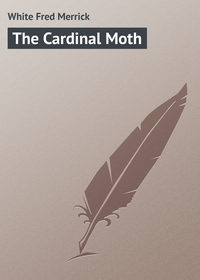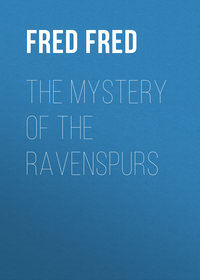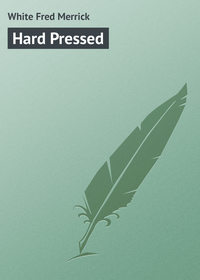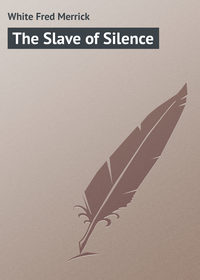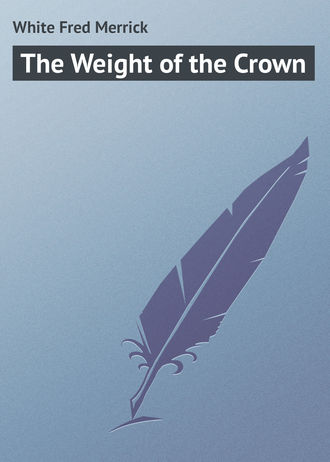 полная версия
полная версияThe Weight of the Crown
The General bowed coldly. He looked on the speaker as the cause of all the trouble. He was not going to accept a mere protestation of innocence in this way. And yet there was a ring of sincerity in what Maxwell said. He was here, also, of his own free will, and his news was serious.
"So that accursed woman has hit the right nail again," he growled. "That letter you speak of means mischief to me. I wonder if the countess knows that I am wounded? I dare say she does. I might have been murdered in my bed if you had not come."
"You would have been murdered," Maxwell retorted. "That is absolutely certain. Are you very ill?"
"No; it was merely a flesh wound in the shoulder. The bullet has been extracted. I lost blood, and I am feeling rather weak at present, but in a day or two I shall be quite myself again."
"How did you manage to keep the thing so quiet?"
"I sent for a doctor friend of mine. He was with me in the first Asturian campaign – a fellow who has a fortune, and loves doctoring as a pastime. He knows a lot about the Balkan business. I asked him to keep this matter a secret, and he has done so. Is there anything else I can tell you?"
"It seems to me that there is a good deal that you can tell me," Maxwell replied. "When you walked off with the king's clothes you probably went away with papers that may be used with great effect against Russia if they fall into proper hands – our hands, that is. If you don't mind, I shall be glad to turn out the pockets of that coat."
"That is an excellent idea," Maxgregor said. "What did I do? – oh, I know. The porter took the whole suit down to be brushed; as I don't keep a man he acts as my valet. If you would not mind going down into the hall and asking the fellow?"
Maxwell vanished at once. But the hall porter had departed for the night, so the occupant of another set of chambers said as he opened the outer door with his latchkey. At the same moment a figure bolted past the door, a figure with coat collar turned up and hat pulled down. It was the double of the King of Asturia. Maxgregor's face grew stern as he heard.
"Let us anticipate events," he said. "Put out the lights in my sitting-room and close the door. When you have done that put out the light here also. There is a way into the corridor out of this room without going through the sitting-room. Place the key of the sitting-room door on the outside."
Maxwell crept back presently, having accomplished his task. For half an hour or more the two sat in the pitch darkness saying not a word to each other. It seemed a long time, but the watchers knew that something was going to happen and stifled their impatience. Presently Maxwell felt that a hand was clutching him by the arm. Maxgregor was whispering something in his ear.
And under the folding doors a long slit of light filtered into the bedroom. Somebody had turned up the light in the sitting-room!
CHAPTER XXVI
LOYAL SILENCE
It was getting late by this time. Gradually the guests were thinning and the splendid rooms were taking on a deserted appearance. Jessie sat in one of the corridors hidden away behind a bank of palms and azaleas, and longed for the time when she could rest. From head to foot she was aching with fatigue. She had not been used to excitement lately; the close atmosphere of the Bond Street establishment and the want of regular exercise in the pure air had told upon her. Now that the excitement had passed away she realized how tired she was.
She laid her head back against the wall and closed her eyes. So utterly exhausted was she that she did not seem to care what happened. And there would be much to be done in the morning. If only Vera Galloway could be restored to her proper place, Jessie vowed that nothing should prevail upon her to carry on the adventure. She slept just for a moment. She might have stayed there till daylight, only Ronald Hope came along and found her.
At the sound of a human voice Jessie became quite alert and vigorous again.
"How you startled me," she said. "I was asleep. Is there anything fresh, any new complication?"
Ronald dropped into the seat by Jessie's side. He was looking just a little grave and stern. It was possible to detain Jessie there for some little time.
"There is nothing fresh," he said. "I have a few words to say to you, Jessie. Everybody is going, and only a few of Lady Merehaven's intimate friends remain."
"If you are one of them you will not be expected to leave just yet," Jessie smiled. "But why look so serious, Ronald? Have I done anything?"
"Upon my word, I don't know," Ronald said in some perplexity. "I don't like it, Jess. If you look at it from a proper point of view you have no business to be here at all. Lady Merehaven is a dear friend of mine. What would she say if she knew everything? As a matter of fact, she is bound to know everything sooner or later."
"But you can't blame me," Jessie protested. "Look at my position. I was quite desperate. I had been dismissed from Bond Street for no fault of my own; I had a sister practically depending upon me; it was useless in the circumstances to try and find employment elsewhere. I was face to face with something very like starvation, my dear Ronald."
Ronald's face softened, but the perplexed frown on his face was still there.
"Oh, I know it," he said eagerly. "I see your position entirely. At the same time, it is quite wrong. I am looking at the social side of the question. And the worst of the affair is that you must go on now till Vera Galloway comes back. I have been trying to find some way to achieve that without delay. If it can be managed, you must promise never to change your identity again."
Something like tears rose into Jessie's eyes. The dull, tired feeling was coming over her again.
"Don't blame me, dear," she whispered. "Think of my position. I had not met you this afternoon; I did not dream that you still cared for me. And yet I fancy that I would have done the same in any case. A good and noble girl comes to me in great trouble; she asks me to help her out of a grave difficulty to save one she loves. To help her I do this. And she has more or less succeeded. Between the two of us we have gone far to save a nation. Tell Lady Merehaven if you like, but do not spoil everything in the moment of victory."
"I don't want to," Ronald said. "It would be ridiculous to speak just yet. But any moment some unexpected accident may find you out. It may come before bedtime. And what would happen to you then? I am very jealous for the good name of my future wife. Dr. Varney – "
"Dr. Varney is standing by me nobly, and he will see that I am safe," Jessie said. "Dear old boy, don't be afraid. Trust me a little longer, and I am quite sure – "
"My darling, I trust you implicitly," Ronald exclaimed. He bent forward and kissed Jessie's trembling lips. "Only I am so miserably anxious, so fearful lest – But somebody is coming."
Somebody came down the corridor, pushing the azaleas carelessly aside from time to time. The newcomer was evidently looking for somebody. Then the grey face of Lechmere appeared, white and excited as Ronald had never seen him before. He paused before the others.
"Miss – er – Galloway, I have been looking for you everywhere," he said. "It is of the utmost importance that – "
"Oh, dear!" said Jessie with a little broken laugh. "Please don't tell me that I have to do anything else to-night. I am utterly worn out. If I could go straight to bed – "
"So you may as far as I am concerned," Lechmere said curtly. "I beg your pardon, but I fancy I have made a discovery of importance. That man whom you took to be the King of Asturia – I mean the man you saw in the Countess Saens's dining-room. What became of him?"
"Really, I cannot tell you," Jessie said. "Let me think. I fancy Mr. Maxwell said something about him. Yes, that was it. He said that the man you mention drove to the office of the Mercury. Mr. Maxwell would have followed him, only he could not spare the time."
Lechmere nodded as if pleased about something, but the stern look was still on his face.
"I fancy that is all that I need bother you about at present," he said. "And I don't think that we shall need your services any more to-night, my dear young lady. If you can contrive to see Dr. Varney on your ride before breakfast in the morning, you will be doing everybody a service."
Lechmere darted away as hurriedly as he had come. Evidently he had work of importance before him.
"He has given me one useful piece of information," Jessie said as soon as Lechmere had gone. "If what he remarks is correct, Miss Galloway is in the habit of riding before breakfast. Well, I shall be able to fulfil that part of the programme, Ronald. It will be delightful to be on the back of a horse again, even in a borrowed habit, which I sincerely hope will fit me."
Ronald looked at the mass of chiffon and the quivering fall of drapery before him and smiled. The dress might have been made for the wearer, so perfectly did it seem to fit her.
"This is quite another matter," Jessie said. "One can do wonders with a little lace and a bow or two of chiffon. But a close-fitting riding habit is quite another thing. I dare say I shall manage. There is only one thing that really fills me with terror."
"I should like to know what that is," said Ronald.
"Why, Countess Saens. I am quite sure that she knows what has taken place – at least, she suspects, and will find out dual identity, or she would never have tried to gain admission to the hospital to-night. I am perfectly sure that she will make another attempt in the morning. She is clever and unscrupulous, and she is certain to get her own way. In the accident ward of a hospital there is always a case or two that needs identity, and there will be the chance of the countess. She professes to have missed somebody, and she will be able to walk through the accident ward. That is all she requires. And I am quite certain that she will do this thing in the course of the morning. Don't you agree with me?"
Ronald was fain to agree with what Jessie said. Perhaps some scheme for baffling the countess was already in the air, as Lechmere would not have suggested that early morning visit to Varney.
"I have been thinking the matter out," Jessie went on. "Why could not Miss Galloway be removed to a private ward? If Dr. Varney called at the hospital he could see the patient and drop a hint to that effect. You see what is uppermost in my mind, Ronald. A private ward affords chance of escape, also chance for me to take Miss Galloway's place and let her come home."
"You are a friend in need," Ronald said as he kissed the red lips again. "It was a lucky thing for Vera Galloway when she thought of you. But there are risks even in this scheme. Suppose the maid who was present when the robbery at the Countess Saens's took place comes forward and identifies you, what then? You will be charged with burglary, and perhaps convicted. The police will find out all about you – your name will figure largely in the newspapers."
Jessie hesitated a little before she replied. Her head fell forward, and she fell almost asleep on Ronald's arm. Nothing seemed to matter to her now; if only she could have a good night's rest.
"I don't seem to care," she murmured. "I don't fancy that the countess would go that far. It isn't as if she stood any chance of recovering the stolen papers. And she would have to give a description of the missing documents, which would not suit her book at all. On the whole, I am prepared to take any risk so that I can spare Vera Galloway further misery."
And Ronald had nothing further to say. It was good to know that he had the love of a girl like this. She should carry out her resolution, and he would maintain a loyal silence for the present.
CHAPTER XXVII
LECHMERE TO THE RESCUE
With a new object uppermost in his mind Lechmere left Merehaven House and took his way into Piccadilly. The roads were almost deserted now, save for a solitary foot-passenger and a dingy night cab. One of these crept along presently, and Lechmere ordered the driver to take him to Fleet Street. In contrast with the West End there was bustle and animation enough in the street that never sleeps. It was near to the hour when the great morning papers went to press; there were lights everywhere, and the hoarse rattle of machinery. Lechmere came at length to the offices of the Mercury and demanded to see the editor. The request was an unusual one at so late an hour, and the clerk asked if the visitor had an appointment.
"I have no appointment at all," Lechmere said. "But at the same time I am going to see the editor. Give my card to Mr. Hunt, and say that I will not detain him many moments."
There was something in Lechmere's manner that caused the clerk to take the card without further protest. Lechmere had before now forced himself in times of emergency on the great ones of the earth, so that he was not going to be baffled by a newspaper editor, important functionary as the latter was. He waited some little time before the clerk returned.
Mr. Hunt was very busy, he said, and was sorry he could not see the gentleman. Perhaps he would like to call later on, or send up the nature of his business? Some very important news had come in late, and in the circumstances it was impossible for the editor to grant an interview to anybody.
Lechmere said he would call again, and turned for the door. But he had no intention of being put off in this way. He paused as a rush of business distracted the attention of the clerk. In a corridor leading to a flight of steps two jaded-looking reporters were talking eagerly.
"Is it a fake or a real thing?" the first one said. "I've just come back from Westminster – scene in the House, don't you know – and Gregg would not even look at us. Said we had a real good thing on."
"Then you didn't get to the bottom of what it was?" the other asked eagerly.
"No, I didn't. Something about the King of somewhere and a row in the office. Anyway, the whole of the staff up in the composing-room are working with closed doors, so that no hated rival shall get a sniff of what is going on. We are evidently in for a big sensation."
Lechmere waited for no more; he gripped his opportunity with both hands. He advanced along the corridor to where the two men were talking, and asked what floor Mr. Hunt's office was on. The two men looked at him with something of admiration on their faces. Hunt was a martinet in his office, and difficult of access at all times.
"Second floor on the right," one of the reporters said with a wink at his companion. "Don't knock, but walk right in. Hunt is always glad to see visitors at this hour. It is a refreshing change after the grind of the night. He'll be quite pleased to see you."
Lechmere grimly expressed his thanks, though the sarcastic force of the words and the wink were not lost on him. He was here to see Hunt, and he was going to do it at any cost. He made his way up the staircase and along to the second floor, where a door with the name of Hunt in large letters attracted his eye. The door of the room was shut, but Lechmere walked in.
The room was empty for the moment. The floor was littered with paper and proofs; on the desk a slip of galley proof lay. The heading attracted Lechmere's attention, and he whistled. Then he sat calmly down to await Mr. Hunt's return. He had no undue trial of his patience, for a moment later the editor of the Mercury bustled into the room.
There was a pleased smile on his face; he seemed to be on the best of terms with himself. But the smile faded away, and the mean, eager face grew anxious as Hunt detected the presence of his visitor.
"Now this is really too bad, Mr. Lechmere," he protested. Lechmere did not fail to notice the agitation of the speaker's voice. "Of course, I had your card. I sent a message down for you. If you had been the king I would not have seen you to-night. I never see anybody after twelve o'clock. I repeat, if you had been the king I should have had to refuse you an audience."
"Sounds exceedingly impressive, not to say regal," Lechmere remarked in a dry tone, and without the slightest suggestion of an apology. "What king do you happen to mean?"
"Why, the King of England, of course," Hunt puffed. "Any living king, as a matter of fact."
"Any king in the Almanach de Gotha– with the exception of the King of Asturia, eh?"
The question was couched in a tone of easy badinage, but its effect on Hunt was wonderful. The face grew grey and his hands trembled. If he had been accused of some crime he could not have looked more agitated. He tried to bluff, but he could only stammer something incoherent.
"Really, I don't know what you mean," he said. "The King of Asturia, you say?"
"My words were quite plain, Mr. Hunt. I came here to-night determined to see you and determined not to be bluffed by all the clerks in your office. Your paper has gone to press, and therefore you must have a few minutes to spare. You need not be afraid. Your composing-room door is locked, and the present item of news destined for your readers is not likely to leak out. Will you be so good as to let me have an advanced copy of the paper?"
"Certainly not," Hunt said. "This is an outrage. If you do not leave my office – "
"Sit down," Lechmere said sternly. He might have been speaking to an unruly hound. "You are not going beyond that door without we have an explanation. The King of Asturia was here to-night. If you deny it, I shall give you the lie from that printed proof on the table before you."
Hunt glanced at the long galley slip and wriggled. All his dignity had vanished.
"I am not going to deny it," he said. "The King of Asturia has been here. He came in a cab. I did not send for him, he came of his own free will. He gave me certain information – "
"I have not the slightest doubt of it," Lechmere said drily. "Unfortunately, his majesty has made for himself in London the sort of reputation which is coveted only by a certain class of music-hall frequenter and the haunter of the typical Strand bar. There have been occasions when his majesty has exceeded the bounds in the way of intoxicating liquor. Did you see any signs of it to-night?"
Hunt intimated that he had. He was palpably uneasy and uncomfortable. Every admission that he made Lechmere had literally to drag from him.
"The description sounds convincing," Lechmere said. "But suppose I was in a position to tell you that the King of Asturia had not been here in Fleet Street at all?"
"Impossible!" Hunt cried. "I saw his majesty; he sat in that chair for an hour. A man in my position is not likely to make mistakes like that. And he gave me certain information that I propose to make a sensation of. What that information is you will know with the rest of the general public when you get your Mercury at breakfast time."
Lechmere nodded. Beyond the door he could see something in the guise of a foreman printer with a damp news sheet in his hand. He knew at once that here was an early copy of the paper; that early copy he had made up his mind to possess. He rose as if satisfied with his interview.
"Very well," he said. "I will wish you good-night. You have done a foolish thing, and, unless I am greatly mistaken, you are the victim of one of the most mistaken cases of identity ever played off on the editor of a great newspaper. But the fault is on your own head. Good-night."
Lechmere passed out, closing the door behind him. The printer stood there, evidently waiting for him to go. Lechmere silently drew his purse from his pocket and extracted a ten-pound note. This he held up in the glaring light of the passage and pointed to the paper. The printer perspired profusely. Then, with a sudden spasmodic gesture he folded up the paper and placed it in Lechmere's hand, at the same time snatching convulsively for the money. The whole transaction did not take five seconds.
Calm and easy in his triumph, Lechmere walked leisurely down the stairs. Once in Fleet Street he stood under the friendly light of a lamp and opened the paper. As he did so he started. Well in hand as he usually kept himself, Lechmere was surprised to-night.
There it was for anybody to see who had an eye at all; the fifth page was filled with it: —
"The King of Asturia and his people. His majesty visits the Mercury office and speaks freely. Does not care for the responsibilities of State, and has made up his mind to abdicate. Has already signed the declaration to that effect. Prefers Piccadilly to the Balkan service. One of the most amazing romances in the history of Europe."
"Good Heavens!" Lechmere cried. "So that is the game! What a lucky thing I came down here! Of all the audacious things that ever happened, this is the most audacious of all."
He crushed the paper in his hand and hurried breathlessly westward at the top of his speed.
CHAPTER XXVIII
THE POWER OF THE PRESS
The editorial staff of the Mercury had certainly done their work very well. No detail had been spared to make the report absolutely complete. Everybody was reminded that recently there had been a great deal of friction in that corner of the Balkans known as Asturia. It was well known that for many years Russia had coveted that fair province. Up to now the crown of the King of Asturia had been quite safe. But with the advent of the present monarch things were entirely different. King Erno had very early in his career given evidence that he did not appreciate the full measure of responsibility. He was too fond of gaiety and pleasure; he had no patriotism. His people were a stern, hard-living race, and they did not tolerate the gaiety of the new court.
The queen was all very well, but she was only the consort, after all. It was useless for her to be ever on the spot whilst the king was dissipating his fortune and spending the money ground from his people by extra taxation in London and Paris. And latterly eyes had been turned to Vienna, where dwelt Prince Alix, who was known to covet the throne. At any moment there might be a glaring tragedy, and Prince Alix might find himself with the crown. That Prince Alix was notoriously a friend of Russia mattered little at the present juncture.
Lechmere read all this as he hurried along Fleet Street. He also read a lot of information that was true, and more that was false. Evidently the Mercury people cared for nothing beyond the sensation of the hour. But after all this came the sting of the thing. The King of Asturia had that night gone down to the Mercury office and demanded audience of the editor. He had been very wild and violent, and the intimation that he was hopelessly intoxicated was not very carefully concealed. The king wished it to be understood that he had done with Asturia. He had not the slightest intention of going back to his capital any more. His abdication was signed, and doubtless by that time a deputation was on its way to Vienna to offer the throne to Prince Alix. Altogether, it was perhaps the most sensational report that ever appeared even in an American paper. It was certain to create a great commotion, and set all the courts of Europe by the ears.
"Well, of all the amazing audacity!" Lechmere muttered as he raced along. "Nothing more daring had ever been done in the history of political intrigue. I wonder if Hunt suspects the truth. Not that it would make any difference to him so long as he could shift the responsibility afterwards, as I daresay he will be prepared with proofs that he was justified in what he did. There is only one way to get even with this thing."
Lechmere arrived at length at the office of the Daily Herald. The paper in question had very little taint of the modern spirit about it. There was no chance, for instance, that it would ever be published for less than a penny. The Herald had no very great reputation for enterprise, but it was sound and safe, and everything therein would be accepted as true. No newspaper in the kingdom carried more weight, no journal had a greater reputation for veracity.
The Herald had not gone to press yet. There was no great hurry, seeing that the feverish rush to capture circulation had never commended itself to the paper's proprietors. There was a sense of decorum about the office that had been lacking in the entourage of the Mercury. The place seemed more dignified; there was no noise; all the corridors had felted floors. Even down in the manager's office the same decorum prevailed.


